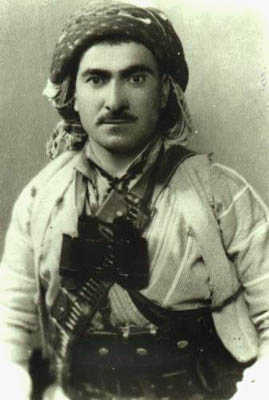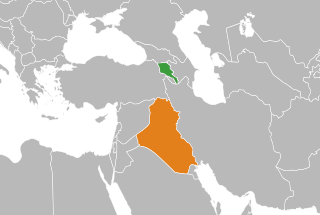Related Research Articles

Iraq under the Arab Socialist Ba'ath Party saw severe violations of human rights. Secret police, state terrorism, torture, mass murder, genocide, ethnic cleansing, rape, deportations, extrajudicial killings, forced disappearances, assassinations, chemical warfare, and the destruction of the Mesopotamian marshes were some of the methods Saddam Hussein and the country's Ba'athist government used to maintain control. Saddam committed crimes of aggression during the Iran–Iraq War and the Gulf War, which violated the Charter of the United Nations. The total number of deaths and disappearances related to repression during this period is unknown, but is estimated to be at least 250,000 to 290,000 according to Human Rights Watch, with the great majority of those occurring as a result of the Anfal genocide in 1988 and the suppression of the uprisings in Iraq in 1991. Human Rights Watch and Amnesty International issued regular reports of widespread imprisonment and torture.

Iraqi Kurdistan or Southern Kurdistan refers to the Kurdish-populated part of northern Iraq. It is considered one of the four parts of "Kurdistan" in West Asia, which also includes parts of southeastern Turkey, northern Syria, and northwestern Iran. Much of the geographical and cultural region of Iraqi Kurdistan is part of the Kurdistan Region (KRI), an autonomous region recognized by the Constitution of Iraq. As with the rest of Kurdistan, and unlike most of the rest of Iraq, the region is inland and mountainous.

Mustafa Barzani, also known as Mela Mustafa, was a Kurdish leader, general and one of the most prominent political figures in modern Kurdish politics.

The Anfal campaign was a counterinsurgency operation which was carried out by Ba'athist Iraq from February to September 1988 during the Iraqi–Kurdish conflict at the end of the Iran–Iraq War. The campaign targeted rural Kurds because its purpose was to eliminate Kurdish rebel groups and Arabize strategic parts of the Kirkuk Governorate. The Iraqis committed atrocities on the local Kurdish population, mostly civilians.

Nechirvan Idris Barzani is a Kurdish politician serving as the second President of Kurdistan Region, Iraq. He was elected into office by the Kurdistan Region Parliament in June 2019. Nechirvan Barzani was appointed as Vice President of the Kurdistan Democratic Party since 2010. He previously served as Prime Minister of the Kurdistan Regional Government from March 2007 to August 2009 and March 2012 to May 2019. Nechirvan Barzani is also the founder of the University Of Kurdistan Hewlêr, the region's top ranking university located in Erbil. His rule combines aspects of Kurdish nationalism, national conservatism, economic liberalism, modernism and reforms, reforms in agriculture and women's rights.
Idris Barzani was a Kurdish politician in the Kurdistan Region. He was the brother of Massoud Barzani, the former president of the Kurdistan Region and the father of Nechervan Idris Barzani, the current president of the Kurdistan Region. He was often on diplomatic trips for the Kurdistan Democratic Party He died on January 31, 1987, of a heart attack.

Iraqi Armenians are Iraqi citizens and residents of Armenian ethnicity. Many Armenians settled in Iraq after fleeing the 1915 Armenian genocide. It is estimated that there are 10,000–20,000 Armenians living in Iraq, with communities in Baghdad, Mosul, Basra, Kirkuk, Baqubah, Dohuk, Zakho and Avzrog.

Ahmed Mohammad Barzani, also known as Khudan, was the head of the Barzani tribe in Kurdistan. Sheikh Ahmed is considered to be the architect of Barzani rule in Iraqi Kurdistan. He was a Kurdish nationalist who brought many different Kurdish tribes under his command and expanded the Barzan region. Along with his younger brother Mustafa Barzani, he fought against the Iraqi government in the 1920s and 1930s.

The Iraqi Kurdish Civil War was a civil war that took place between rival Kurdish factions in Iraqi Kurdistan during the mid-1990s, mostly between the Patriotic Union of Kurdistan and the Kurdistan Democratic Party. Over the course of the conflict, Kurdish factions from Iran and Turkey, as well as Iranian, Iraqi and Turkish forces, were drawn into the fighting, with additional involvement from American forces. Between 35,000 and 40,000 fighters and civilians were killed.

The Kurdistan Democratic Party, usually abbreviated as KDP or PDK, is the largest party in Iraqi Kurdistan and the senior partner in the Kurdistan Regional Government. It was founded in 1946 in Mahabad in Iranian Kurdistan. The party states that it combines "democratic values and social justice to form a system whereby everyone in Kurdistan can live on an equal basis with great emphasis given to rights of individuals and freedom of expression."
Jash is a Kurdish term for a traitor, or a type of collaborator, either a military unit composed of Kurds or an individual which cooperates with enemy combatants against the Kurdish people, Kurdish political interests, or the Kurdish Army. The term is considered derogatory in a cultural sense, in much the same way as the use of the term quisling in the Western world.

The 1983–1986 Kurdish rebellions in Iraq occurred during the Iran–Iraq War as PUK and KDP Kurdish militias of Iraqi Kurdistan rebelled against Saddam Hussein as part of the Iraqi–Kurdish conflict, in an attempt to form an independent state. With Iraqi government forces occupied by the Iran-Iraq War, Kurdish Peshmerga succeeded in taking control of some enclaves, with Iranian logistic and sometimes military support. The initial rebellion resulted in stalemate by 1985.

Ali Askari (1936–1978) was a Kurdish politician, military leader, and revolutionary. He was a prominent leader in Iraqi Kurdistan and his political party was the Patriotic Union of Kurdistan (PUK).
The Second Iraqi–Kurdish War was the second chapter of the Barzani rebellion, initiated by the collapse of the Kurdish autonomy talks and the consequent Iraqi offensive against rebel KDP troops of Mustafa Barzani during 1974–1975. The war came in the aftermath of the First Iraqi–Kurdish War (1961–1970), as the 1970 peace plan for Kurdish autonomy had failed to be implemented by 1974. Unlike the previous guerrilla campaign in 1961–1970, waged by Barzani, the 1974 war was a Kurdish attempt at symmetric warfare against the Iraqi Army, which eventually led to the quick collapse of the Kurds, who were lacking advanced and heavy weaponry. The war ended with the exile of the Iraqi KDP party and between 7,000–20,000 deaths from both sides combined.

The Iraqi–Kurdish conflict consists of a series of wars, rebellions and disputes by the Kurds against the central authority of Iraq starting in the 20th century shortly after the defeat of the Ottoman Empire in World War I. Some put the marking point of the conflict beginning to the attempt by Mahmud Barzanji to establish an independent Kingdom of Kurdistan, while others relate to the conflict as only the post-1961 insurrection by the Barzanis. Since the US-led invasion of Iraq and the subsequent adoption of federalism and the recognition of the Kurdistan Region (KRI) as a federal entity in the new Iraqi constitution, the number and scope of armed clashes between the central government of Iraq and the Kurds have significantly decreased. In spite of that, however, there are still outstanding issues that continue to cause strife such as the disputed territories of northern Iraq and rights to export oil and gas, leading to occasional disputes and armed clashes. In September 2023, following a series of punitive measures by the central government in Iraq against KRI, Masrour Barzani sent a letter to the President of the United States expressing concerns about a possible collapse of the Kurdistan Region, and calling for the United States to intervene.
The problem of Kurdish refugees and displaced people arose in the 20th century in the Middle East, and continues today. The Kurds, are an ethnic group in Western Asia, mostly inhabiting a region known as Kurdistan, which includes adjacent parts of Iran, Iraq, Syria, and Turkey.

Ahmed Barzani revolt refers to the first of the major Barzani revolts and the third Kurdish nationalistic insurrection in modern Iraq. The revolt began in 1931, after Ahmed Barzani, one of the most prominent Kurdish leaders in southern Kurdistan, succeeded in unifying a number of other Kurdish tribes. The ambitious Kurdish leader enlisted a number of Kurdish leaders into the revolt, including his young brother Mustafa Barzani, who became one of the most notorious commanders during this revolt. The Barzani forces were eventually overpowered by the Iraqi Army with British support, forcing the leaders of Barzan to go underground.
The 1943–1945 Barzani revolt was a Kurdish nationalistic insurrection in the Kingdom of Iraq, during World War II. The revolt was led by Mustafa Barzani and was later joined by his older brother Ahmed Barzani, the leader of the previous Kurdish revolt in Iraq. The revolt, initiating in 1943, was eventually put down by the Iraqi assault in late 1945, combined with the defection of a number of Kurdish tribes. As a result, the Barzanis retreated with much of their forces into Iranian Kurdistan, joining the local Kurdish elements in establishing the Republic of Mahabad.
The Peshmerga have historically been Kurdish guerrilla forces combating the ruling power in the region of what is now Iraqi Kurdistan. Under Mahmud Barzanji, the Peshmerga fought against the British Empire after World War I. They also spearheaded revolts against the Iraqi government in 1931–1932 and against Iran in 1946–1947. Under the leadership of Mustafa Barzani, Peshmerga forces fought the Iraqi government in the First and Second Iraqi–Kurdish Wars of the 1960s and 1970s, and supported Iran in the Iran–Iraq War of the 1980s. The Peshmerga became divided between forces loyal to the Kurdistan Democratic Party (KDP) and those loyal to the Patriotic Union of Kurdistan (PUK), a split that led to the Iraqi Kurdish Civil War of 1995–1998. After the 2003 invasion of Iraq, the Peshmerga became the official military forces of the Kurdistan Region, ruled by a KDP-PUK coalition. The Peshmerga have played an important role in re-taking territory occupied by Islamic State of Iraq and the Levant.

Pendro is a village in the Erbil Governorate of Kurdistan Region in Iraq. It is close to the border with Turkey and approximately 15–18 km to the north of Barzan. It is in the territory of the Muzuri tribe and Mount Butin is about 4 km northeast of Pendro. The area of Pendro covers over 10 km2 (4 sq mi). The terrain is highly mountainous, lying within the Zagros; less than 10% of the Pendro is below 1,225 m (4,019 ft), and its highest point is 2,534 m (8,314 ft).
References
- ↑ "Muzexaneya Barzanî". Ria Taza (in Kurdish). June 2, 2020. Retrieved June 25, 2020.
- ↑ Farkas, E. (2003). Fractured States and U.S. Foreign Policy: Iraq, Ethiopia, and Bosnia in the 1990s. Springer. ISBN 9781403982438.
- ↑ Abdulla-Ali, Najat (2006). Empire, frontière et tribu: Le Kurdistan et le conflit de frontière turco-persan (1843-1932) (in French). p. 86.
- 1 2 Kingsbury, Damien (2021). Separatism and the state. p. 132. ISBN 978-0-367-27648-5. OCLC 1201673414.
- ↑ Blaydes, Lisa (2020). State of Repression: Iraq Under Saddam Hussein. p. 157. ISBN 9780691211756.
- ↑ Schleifer, Yigal (April 7, 2003). "Kurdish leader a Jew?" . Retrieved June 25, 2020.
- ↑ "Tari̇kat, İsyan Ve Si̇yaset Üçgeni̇nde Ortadoğu'nun Asi̇ Aşi̇reti̇: Barzani̇ler" (PDF). Journal of Social and Humanities Sciences Research (in Turkish). 5 (25): 2321. 2018.
- ↑ "Kurdistan Region marks 36th anniversary of Barzani genocide". Kurdistan24. July 31, 2019. Retrieved June 25, 2020.
- ↑ Ihsan, Mohammed (June 17, 2016). Nation Building in Kurdistan: Memory, Genocide and Human Rights. Routledge. p. 67. ISBN 9781317090168.
- ↑ "Saddam Hussein confirms the execution of the Barzanis". YouTube. Archived from the original on December 19, 2021.
- ↑ "From Blueprint to Genocide?" (PDF). drmohammedihsan.com. Archived from the original (PDF) on January 9, 2017.
- ↑ "Iraqi tribunal rules Barzani killings in 1983 were genocide". ekurd.net.
- ↑ "Various waves of Kurdish genocide". uk.gov.krd. Archived from the original on September 1, 2017.
- ↑ Gordon, Michael R.; Callimachi, Rukmini (November 12, 2015). "Kurds Retake Strategic Highway in Iraq's North From ISIS (Published 2015)". The New York Times. ISSN 0362-4331 . Retrieved October 19, 2020.